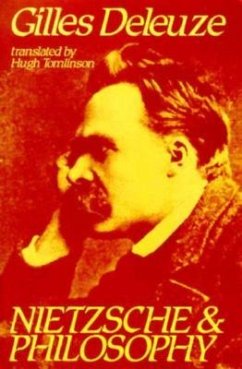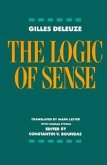23,99 €
inkl. MwSt.
Versandfertig in über 4 Wochen
- Broschiertes Buch
- Merkliste
- Auf die Merkliste
- Bewerten Bewerten
- Teilen
- Produkt teilen
- Produkterinnerung
- Produkterinnerung
Nietzsche and Philosophy has long been recognized as one of the most important accounts of Nietzsche's philosophy, acclaimed for its rare combination of scholarly rigour and imaginative interpretation. Yet this is more than a major work on Nietzsche: the book opened a whole new avenue in post-war thought. Here Deleuze shows how Nietzsche began a new way of thinking which breaks with the dialectic as a method and escapes the confines of philosophy itself.
Andere Kunden interessierten sich auch für
![What Is Philosophy? What Is Philosophy?]() Gilles DeleuzeWhat Is Philosophy?23,99 €
Gilles DeleuzeWhat Is Philosophy?23,99 €![The Logic of Sense The Logic of Sense]() Gilles DeleuzeThe Logic of Sense24,99 €
Gilles DeleuzeThe Logic of Sense24,99 €![The Fragmentary Demand The Fragmentary Demand]() Ian JamesThe Fragmentary Demand30,99 €
Ian JamesThe Fragmentary Demand30,99 €![Power Power]() Michel FoucaultPower24,99 €
Michel FoucaultPower24,99 €![Psyche, Volume 1 Psyche, Volume 1]() Jacques DerridaPsyche, Volume 132,99 €
Jacques DerridaPsyche, Volume 132,99 €![Derrida's of Grammatology Derrida's of Grammatology]() Arthur BradleyDerrida's of Grammatology25,99 €
Arthur BradleyDerrida's of Grammatology25,99 €![Psyche Psyche]() Jacques DerridaPsyche32,99 €
Jacques DerridaPsyche32,99 €-
-
-
Nietzsche and Philosophy has long been recognized as one of the most important accounts of Nietzsche's philosophy, acclaimed for its rare combination of scholarly rigour and imaginative interpretation. Yet this is more than a major work on Nietzsche: the book opened a whole new avenue in post-war thought. Here Deleuze shows how Nietzsche began a new way of thinking which breaks with the dialectic as a method and escapes the confines of philosophy itself.
Hinweis: Dieser Artikel kann nur an eine deutsche Lieferadresse ausgeliefert werden.
Hinweis: Dieser Artikel kann nur an eine deutsche Lieferadresse ausgeliefert werden.
Produktdetails
- Produktdetails
- Verlag: Columbia University Press
- Columbia Classics edition
- Seitenzahl: 221
- Erscheinungstermin: 20. Mai 1985
- Englisch
- Abmessung: 209mm x 136mm x 15mm
- Gewicht: 263g
- ISBN-13: 9780231056694
- ISBN-10: 0231056699
- Artikelnr.: 41421996
- Verlag: Columbia University Press
- Columbia Classics edition
- Seitenzahl: 221
- Erscheinungstermin: 20. Mai 1985
- Englisch
- Abmessung: 209mm x 136mm x 15mm
- Gewicht: 263g
- ISBN-13: 9780231056694
- ISBN-10: 0231056699
- Artikelnr.: 41421996
Gilles Deleuze was professor of philosophy at the University of Paris, Vincennes St. Denis. He is the author of Difference and Repitition, Empiricism and Subjectivity, Logic of Sense, Negotiations 1972-1990, and Why Philosophy? (with Felix Guattari)-- all published in the European Perspectives series.Hugh Tomlinson, the translator, studied at the University of Paris, attending Deleuze's seminars.
Preface to the English Translation
Translator's Notes
Abbreviations of Nietzsche's Works
The Tragic
The Concept of Genealogy
Sense
The Philosophy of the Will
Against the Dialectic
The Problem of Tragedy
Nietzsche's Evolution
Dionysus and Christ
The Essence of the Tragic
The Problem of Existence
Existence and Innocence
The Dicethrow
Consequences for the Eternal Return
Nietzsche's Symbolism
Nietzsche and Mallarme
Tragic Thought
The Touchstone
Active and Reactive
The Body
The Distinction of Forces
Quantity and Quality
Nietzsche and Science
First Aspect of the Eternal Return: as cosmological and physical doctrine
What is the Will to Power
Nietzsche's Terminology
Origin and Inverted Image
The Problem of the Measure of Forces
Hierarchy
Will to Power and Feeling of Power
The Becoming-Reactive of Forces
Ambivalence of Sense and of Values
Second Aspect of the Eternal Return: as ethical and selective thought
The Problem of the Eternal Return
Critique
Transformation of the Sciences of Man
The Form of the Question in Nietzsche
Nietzsche's Method
Against his Predecessors
Against Pessimism and against Shopenhauer
Principles for the Philosophy of the Will
Plan of The Genealogy of Morals
Nietzsche and Kant from the Point of View of Principles
Realisation of Critique
Nietzsche and Kant from the Point of View of Consequences
The Concept of Truth
Knowledge, Morality and Religion
Thought and Life
Art
New Image of Thought
From Ressentiment to the Bad Conscience
Reaction and Ressentiment
Principle and Ressentiment
Typology and Ressentiment
Characteristics of Ressentiment
Is he Good? Is he Evil?
The Paralogism
Development of Ressentiment: the Judaic priest
Bad Conscience and Interiority
The Problem of Pain
Development of Bad Conscience: The Christian priest
Culture Considered from the Prehistoric Point of View
Culture Considered from the Post-Historic Point of View
Culture Considered from the Historical Point of View
Bad Conscience, Responsibility, Guilt
The Ascetic Ideal and the Essence of Religion
Triumph of Reactive Forces
The Overman: Against the Dialectic
Nihilism
Analysis of Pity
God is Dead
Against Hegelianism
The Avatars of the Dialectic
Nietzsche and the Dialectic
Theory of the Higher Man
Is Man Essentially "Reactive"?
Nihilism and Transmutation: the focal point
Affirmation and Negation
The Sense of Affirmation
The Double Affirmation: Ariadne
Dionysus and Zarathustra
Conclusion
Notes
Translator's Notes
Abbreviations of Nietzsche's Works
The Tragic
The Concept of Genealogy
Sense
The Philosophy of the Will
Against the Dialectic
The Problem of Tragedy
Nietzsche's Evolution
Dionysus and Christ
The Essence of the Tragic
The Problem of Existence
Existence and Innocence
The Dicethrow
Consequences for the Eternal Return
Nietzsche's Symbolism
Nietzsche and Mallarme
Tragic Thought
The Touchstone
Active and Reactive
The Body
The Distinction of Forces
Quantity and Quality
Nietzsche and Science
First Aspect of the Eternal Return: as cosmological and physical doctrine
What is the Will to Power
Nietzsche's Terminology
Origin and Inverted Image
The Problem of the Measure of Forces
Hierarchy
Will to Power and Feeling of Power
The Becoming-Reactive of Forces
Ambivalence of Sense and of Values
Second Aspect of the Eternal Return: as ethical and selective thought
The Problem of the Eternal Return
Critique
Transformation of the Sciences of Man
The Form of the Question in Nietzsche
Nietzsche's Method
Against his Predecessors
Against Pessimism and against Shopenhauer
Principles for the Philosophy of the Will
Plan of The Genealogy of Morals
Nietzsche and Kant from the Point of View of Principles
Realisation of Critique
Nietzsche and Kant from the Point of View of Consequences
The Concept of Truth
Knowledge, Morality and Religion
Thought and Life
Art
New Image of Thought
From Ressentiment to the Bad Conscience
Reaction and Ressentiment
Principle and Ressentiment
Typology and Ressentiment
Characteristics of Ressentiment
Is he Good? Is he Evil?
The Paralogism
Development of Ressentiment: the Judaic priest
Bad Conscience and Interiority
The Problem of Pain
Development of Bad Conscience: The Christian priest
Culture Considered from the Prehistoric Point of View
Culture Considered from the Post-Historic Point of View
Culture Considered from the Historical Point of View
Bad Conscience, Responsibility, Guilt
The Ascetic Ideal and the Essence of Religion
Triumph of Reactive Forces
The Overman: Against the Dialectic
Nihilism
Analysis of Pity
God is Dead
Against Hegelianism
The Avatars of the Dialectic
Nietzsche and the Dialectic
Theory of the Higher Man
Is Man Essentially "Reactive"?
Nihilism and Transmutation: the focal point
Affirmation and Negation
The Sense of Affirmation
The Double Affirmation: Ariadne
Dionysus and Zarathustra
Conclusion
Notes
Preface to the English Translation
Translator's Notes
Abbreviations of Nietzsche's Works
The Tragic
The Concept of Genealogy
Sense
The Philosophy of the Will
Against the Dialectic
The Problem of Tragedy
Nietzsche's Evolution
Dionysus and Christ
The Essence of the Tragic
The Problem of Existence
Existence and Innocence
The Dicethrow
Consequences for the Eternal Return
Nietzsche's Symbolism
Nietzsche and Mallarme
Tragic Thought
The Touchstone
Active and Reactive
The Body
The Distinction of Forces
Quantity and Quality
Nietzsche and Science
First Aspect of the Eternal Return: as cosmological and physical doctrine
What is the Will to Power
Nietzsche's Terminology
Origin and Inverted Image
The Problem of the Measure of Forces
Hierarchy
Will to Power and Feeling of Power
The Becoming-Reactive of Forces
Ambivalence of Sense and of Values
Second Aspect of the Eternal Return: as ethical and selective thought
The Problem of the Eternal Return
Critique
Transformation of the Sciences of Man
The Form of the Question in Nietzsche
Nietzsche's Method
Against his Predecessors
Against Pessimism and against Shopenhauer
Principles for the Philosophy of the Will
Plan of The Genealogy of Morals
Nietzsche and Kant from the Point of View of Principles
Realisation of Critique
Nietzsche and Kant from the Point of View of Consequences
The Concept of Truth
Knowledge, Morality and Religion
Thought and Life
Art
New Image of Thought
From Ressentiment to the Bad Conscience
Reaction and Ressentiment
Principle and Ressentiment
Typology and Ressentiment
Characteristics of Ressentiment
Is he Good? Is he Evil?
The Paralogism
Development of Ressentiment: the Judaic priest
Bad Conscience and Interiority
The Problem of Pain
Development of Bad Conscience: The Christian priest
Culture Considered from the Prehistoric Point of View
Culture Considered from the Post-Historic Point of View
Culture Considered from the Historical Point of View
Bad Conscience, Responsibility, Guilt
The Ascetic Ideal and the Essence of Religion
Triumph of Reactive Forces
The Overman: Against the Dialectic
Nihilism
Analysis of Pity
God is Dead
Against Hegelianism
The Avatars of the Dialectic
Nietzsche and the Dialectic
Theory of the Higher Man
Is Man Essentially "Reactive"?
Nihilism and Transmutation: the focal point
Affirmation and Negation
The Sense of Affirmation
The Double Affirmation: Ariadne
Dionysus and Zarathustra
Conclusion
Notes
Translator's Notes
Abbreviations of Nietzsche's Works
The Tragic
The Concept of Genealogy
Sense
The Philosophy of the Will
Against the Dialectic
The Problem of Tragedy
Nietzsche's Evolution
Dionysus and Christ
The Essence of the Tragic
The Problem of Existence
Existence and Innocence
The Dicethrow
Consequences for the Eternal Return
Nietzsche's Symbolism
Nietzsche and Mallarme
Tragic Thought
The Touchstone
Active and Reactive
The Body
The Distinction of Forces
Quantity and Quality
Nietzsche and Science
First Aspect of the Eternal Return: as cosmological and physical doctrine
What is the Will to Power
Nietzsche's Terminology
Origin and Inverted Image
The Problem of the Measure of Forces
Hierarchy
Will to Power and Feeling of Power
The Becoming-Reactive of Forces
Ambivalence of Sense and of Values
Second Aspect of the Eternal Return: as ethical and selective thought
The Problem of the Eternal Return
Critique
Transformation of the Sciences of Man
The Form of the Question in Nietzsche
Nietzsche's Method
Against his Predecessors
Against Pessimism and against Shopenhauer
Principles for the Philosophy of the Will
Plan of The Genealogy of Morals
Nietzsche and Kant from the Point of View of Principles
Realisation of Critique
Nietzsche and Kant from the Point of View of Consequences
The Concept of Truth
Knowledge, Morality and Religion
Thought and Life
Art
New Image of Thought
From Ressentiment to the Bad Conscience
Reaction and Ressentiment
Principle and Ressentiment
Typology and Ressentiment
Characteristics of Ressentiment
Is he Good? Is he Evil?
The Paralogism
Development of Ressentiment: the Judaic priest
Bad Conscience and Interiority
The Problem of Pain
Development of Bad Conscience: The Christian priest
Culture Considered from the Prehistoric Point of View
Culture Considered from the Post-Historic Point of View
Culture Considered from the Historical Point of View
Bad Conscience, Responsibility, Guilt
The Ascetic Ideal and the Essence of Religion
Triumph of Reactive Forces
The Overman: Against the Dialectic
Nihilism
Analysis of Pity
God is Dead
Against Hegelianism
The Avatars of the Dialectic
Nietzsche and the Dialectic
Theory of the Higher Man
Is Man Essentially "Reactive"?
Nihilism and Transmutation: the focal point
Affirmation and Negation
The Sense of Affirmation
The Double Affirmation: Ariadne
Dionysus and Zarathustra
Conclusion
Notes







